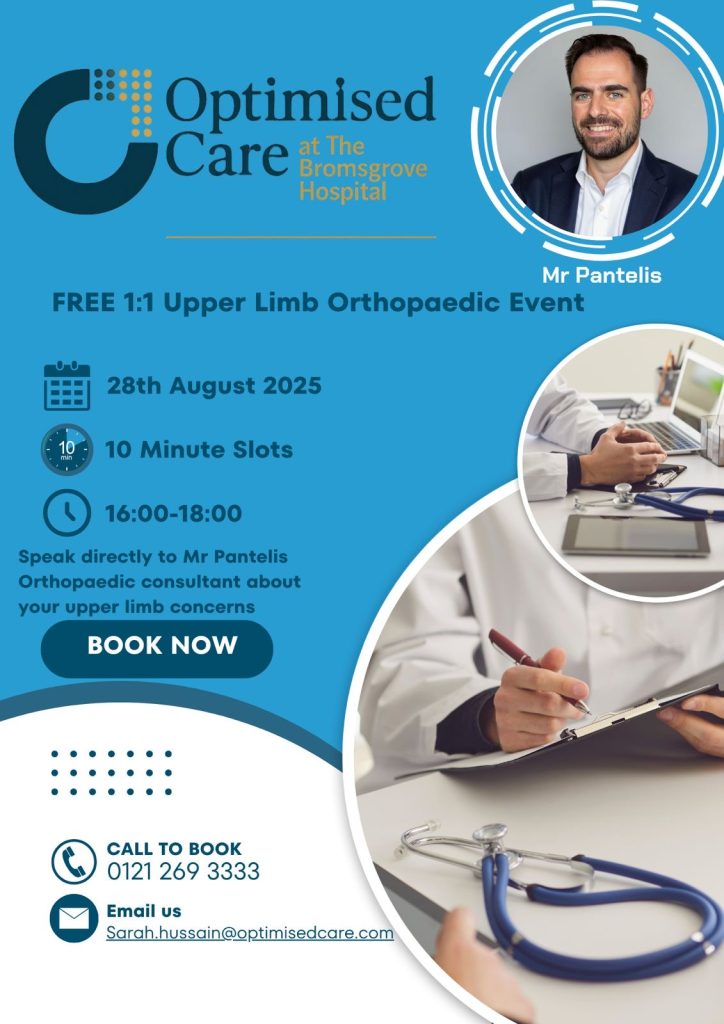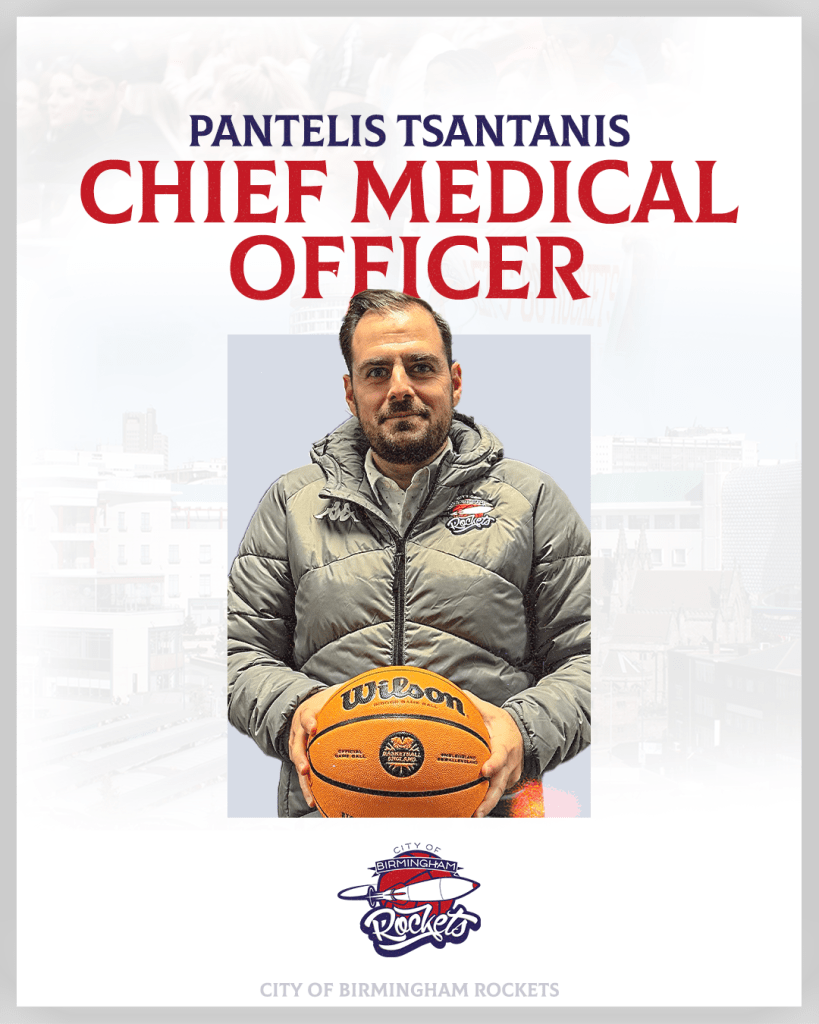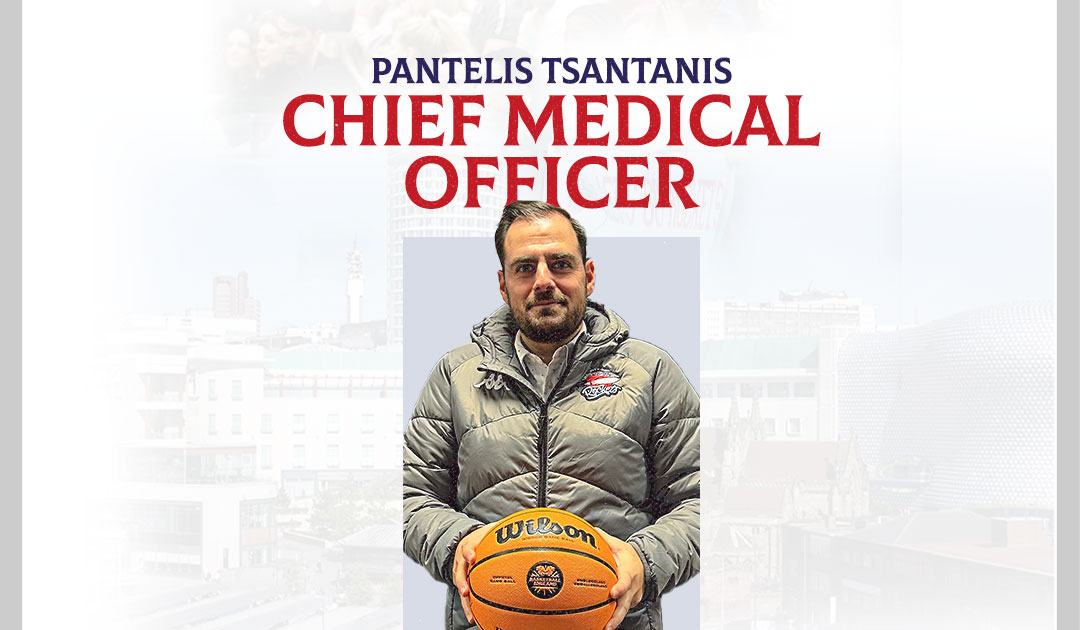Meet our Chief Medical Officer, Pantelis Tsantanis, and learn more about his background, involvement with Rockets and how he can help with any upper limb concerns you may have!
Pantelis and the team at Optimised Care are holding a FREE 1:1 Upper Limb Orthopaedic Event on 28th August from 4pm-6pm at The Bromsgrove Hospital. Call 0121 269 3333 or email Sarah.hussain@optimisedcare.com to book your 10 minute timeslot today!
Can you briefly introduce yourself and describe your professional background in Trauma and Orthopaedic Surgery?
I am a Consultant Trauma and Orthopaedic Surgeon at University Hospitals Birmingham with a specialist focus on upper limb surgery, including complex shoulder, elbow, and hand conditions.
My clinical practice covers both elective and trauma-related cases, with a particular emphasis on keyhole procedures and functional recovery. Alongside my surgical work, I am actively involved in research and education, contributing to national studies and peer-reviewed publications in upper limb orthopaedics.
I regularly collaborate with multidisciplinary teams—including physiotherapists, radiologists, and sports medicine specialists—to deliver holistic, evidence-based care for patients ranging from elite athletes to the general population.
How did you become involved with the City of Birmingham Rockets Basketball Club?
My involvement with the City of Birmingham Rockets grew organically through mutual connections who recognised a shared vision between myself and the club—using sport as a platform for personal growth, community cohesion, and long-term wellbeing.
As someone with a lifelong passion for basketball, the opportunity to contribute to a club that is deeply rooted in the local community and committed to nurturing talent felt like a natural fit.
Collaborating with like-minded individuals who are dedicated to making a difference—both on and off the court—has been a rewarding extension of my professional and personal values.
What does your role as a volunteer consultant at the club typically include on a weekly or monthly basis?
My involvement includes injury assessment, clinical guidance, and medical oversight for players. I work closely with the physiotherapy team to plan rehabilitation strategies and offer support on return-to-play decisions. I also provide educational sessions on injury prevention and musculoskeletal health.
What kind of injuries do you most commonly encounter when working with basketball players?
Basketball places significant stress on the musculoskeletal system, particularly through rapid changes in direction, jumping, and high-impact contact. The most common injuries I encounter include ankle sprains, knee ligament strains—especially anterior cruciate ligament (ACL) injuries—and meniscal tears. Shoulder injuries are also frequent, often related to repetitive overhead movements and collisions, ranging from rotator cuff strains to instability issues. Patellar tendinopathy and stress-related bone injuries are also seen, as well as finger and hand trauma due to the fast-paced and physical nature of the sport.
What inspired you to volunteer your time and expertise to support the Rockets?
I believe strongly in using my skills to create positive change beyond the hospital setting. Supporting young athletes—many of whom may not otherwise have access to specialist care—allows me to contribute to their development and wellbeing in a meaningful way.
Why do you feel it’s important for athletes, especially at the club level, to have access to specialist medical care?
Early and accurate diagnosis, timely intervention, and effective rehabilitation can be game-changing for an athlete’s career and long-term health. Club-level players often don’t have the same access to expertise as elite athletes, and bridging that gap is essential to help them stay healthy and perform at their best.
How does your work at the club align with your personal or professional values?
My values centre around integrity, excellence in care, and community service. The work I do at the club reflects those principles, offering athletes the same level of clinical consideration and support that I provide to my NHS and private patients.
What impact do you hope to have on the athletes you support at the Rockets?
I hope to instil a culture of health literacy, self-care, and injury prevention. Ultimately, I want players to feel supported—not just as athletes, but as individuals with potential that goes beyond the court.
Can you share a particular moment or case at the club that reinforced your decision to volunteer?
One case that stands out involved one of our first team players who sustained a severe hamstring injury. I was able to help organise early specialist imaging, surgical intervention, and a structured rehabilitation programme along with our sports therapists. What really reinforced my commitment was seeing how the athlete is fully engaging with their recovery process—both physically and mentally. Their discipline and positive attitude are key to returning to play at a high level. It remains a powerful reminder of how access to timely, coordinated medical care—paired with an athlete’s own determination—can lead to excellent outcomes and preserve long-term performance.
How do you work with the coaching staff and physiotherapists to support player health and performance?
We operate as a collaborative team, with open communication and shared decision-making. I provide clinical input, while the coaches and physios ensure that interventions are seamlessly integrated into training schedules. This approach ensures a holistic and athlete-centred model of care.
In your opinion, how important is injury prevention education in a sports setting like the Rockets?
It’s absolutely vital. Empowering players with knowledge about biomechanics, load management, nutrition, and recovery not only reduce the risk of injury but also supports long-term athletic development and performance. Prevention is always more effective—and far less disruptive—than treatment. Our recent visit to Aquila Basket Trento, a professional club in Italy, reinforced this approach. Their integration of structured injury prevention programmes into daily routines reflects the standard we’re aspiring to at the Rockets. It’s clear that a culture of education and proactive care is essential for building resilient, high-performing athletes at any level.
What have you learned personally or professionally through your volunteer work with the team?
It’s been a humbling reminder that elite-level principles can and should be applied at grassroots level. I’ve also gained a deeper appreciation for the challenges young athletes face, both physically and mentally, as they pursue their goals.
What advice would you give to other medical professionals considering volunteering their expertise in sports or community settings?
Start small, stay committed, and understand the broader impact your skills can have. It’s a rewarding experience that not only enhances your own practice but also supports the development of individuals and communities in powerful ways.



